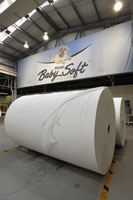
Top stories





Marketing & MediaWarner Bros. was “nice to have” but not at any price, says Netflix
Karabo Ledwaba 1 day

More news

Logistics & Transport
Maersk reroutes sailings around Africa amid Red Sea constraints

















Last year the company collected an average of 5000 tons of waste paper a month as part of its global environmental programme, which was introduced in 1995 to improve sustainability relating to its products and processes.
Towell said Kimberly-Clark has set itself ambitious goals for the reduction of energy use, water consumption, landfill and packaging waste. “At our two manufacturing facilities in South Africa - Springs and Cape Town - we have reduced energy consumption by 24% over the past 13 years and intend to reduce it by a further 29% over the next five years.”
The company has also reduced fresh water consumption by improving process efficiency over the same period, resulting in a 20% reduction in water usage per ton of tissue produced. Plans are in place to reduce this by a further 10% over the next five years.
Importantly, the amount of waste sent to landfill has been reduced by 70% since 1995 and Kimberly-Clark sends less than 2% of the waste that it generates to landfill.
“Amongst the most significant of our sustainability undertakings is our “sludge-to-bricks” project, which alone contributed to a 50% reduction in landfill,” said Towell. Every 45 minutes, 12 tons of waste paper is processed on the production line. It is pulped and then put through a screening process. After this, the glues and inks are removed and the paper is bleached with a chlorine-free process. The resulting fibre is then used in the tissue-manufacturing process and the waste stream from this process is used in the manufacture of bricks.
“Added benefits include reducing the energy required to fire bricks, reducing the actual weight of the bricks by 20%, saving in CO² emissions because of improved transportation efficiency. In addition, the thermal insulation property of the “slug bricks” is vastly improved, which means a lot less energy is required for heating homes or offices that have been built with them,” said Towell.
Kimberly-Clark South Africa's sustainability drive has seen the company achieve ISO 14001 International Environmental Accreditation for its manufacturing facilities.
Towell said the company is taking environmental sustainability a step further by becoming Forest Stewardship Council (FSC) certified. “This is in accordance with the requirements of international customers, who want assurances that their supply chain is in the sustainability loop,” he ended.